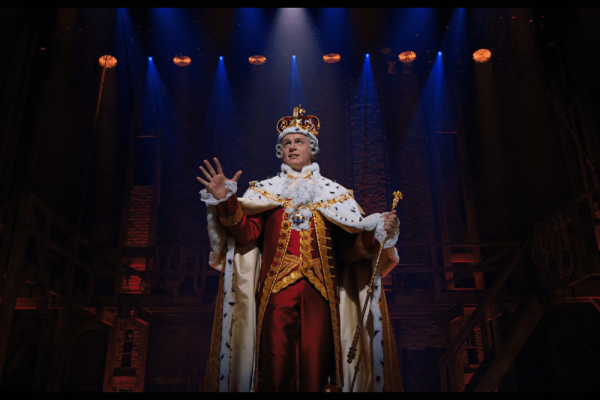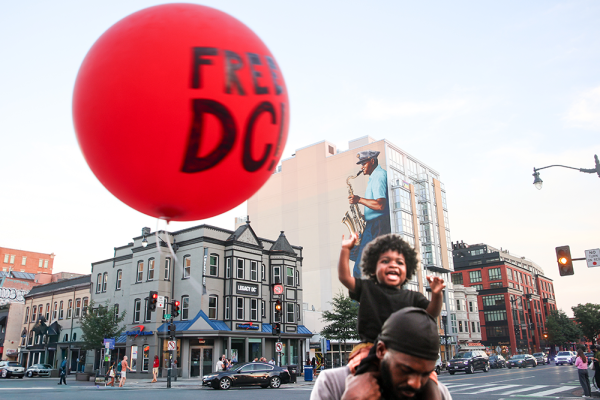Shortly after Hamilton was first released a decade ago, I found myself singing along to it rather loudly while building a new IKEA bed frame in a group house I had just founded.
As I belted out the words to one of the more familiar songs from Act 1, “My Shot,” my new housemate poked her head around the corner and added her own voice to the mix. “I’m just like my country / I’m young, scrappy and hungry,” we sang in unison, creating a moment of joy and connection between a Catholic and a Protestant that provided the foundation for a lasting friendship and community-building work.
It was reflective of that moment in time: Hamilton sing-alongs (like the one my housemate and I hosted in our new living room shortly after move-in) happened alongside a sense of optimism. The musical about Alexander Hamilton’s life and role in the founding of the United States of America felt in harmony with the cultural moment of the time. Barack Obama was president, and there was an air of national progress (in D.C., at least, where I have now lived for 14 years). My partner and I even took a spur-of-the-moment trip to New York City to see most of the original cast perform it live at the Richard Rodgers Theatre on Broadway, relishing the sense of fun that went with being a Hamilton fan.
That’s what Hamilton was back then: Optimistic. Joyful. I felt proud as I watched and listened to people of color portray the stories of men and women who were never meant to be included in the American experiment. As I listened to Daveed Diggs rap, it was almost too easy to forget that most of America’s Founding Fathers were also slave holders who didn’t originally design the country to include full representation and participation for women, Black people, Indigenous people, or people who didn’t own land.
Then, Donald Trump won the 2016 presidential election. The new vice president-elect, Mike Pence, saw Hamilton on a trip shortly afterwards. He wasn’t the first elected official to see the show on Broadway (Obama notably hosted the cast at the White House in March 2016, and Hillary Clinton saw it in July 2016 as part of her run for office). But cast member Brandon Dixon ended the show that night with his fellow cast members standing nearby onstage: “We, sir — we are the diverse America who are alarmed and anxious that your new administration will not protect us, our planet, our children, our parents, or defend us and uphold our inalienable rights, sir. But we truly hope that this show has inspired you to uphold our American values and to work on behalf of all of us.”
READ: The ‘Jesus and John Wayne’ Soundtrack You Didn’t Know You Needed
Much has happened since that moment in time. Instead of a country filled with the inspired optimism of what could be, we are now a country filled with fear. Slowly, over the past 10 years, that fear has eaten away at the feeling that the progress Hamilton advocated for is still possible.
Now, when I listen to Christopher Jackson singing as President George Washington in “One Last Time,” the scripture from Micah 4:4 that he paraphrases as he describes why he’s stepping down after serving two terms in office brings literal tears to my eyes:
“If I say goodbye, the nation learns to move on. It outlives me when I’m gone. Like the scripture says: ‘Everyone shall sit under their own vine and fig tree and no one shall make them afraid.’ They’ll be safe in the nation we’ve made. I want to sit under my own vine and fig tree, a moment alone in the shade at home in this nation we’ve made, one last time.”
From xenophobic immigration policies to a changing climate, from authoritarianism to the stark ideological chasm that divides us, the biblical idea of a nation where no one is afraid seems like a far cry from the reality unfolding around us, one in which people are very, very afraid. Afraid of deportation and detention camps. Afraid of being separated from their families and loved ones. Afraid of the effects of climate change.
What does this mean for the next 10 years of Hamilton, and of George Washington’s complicated yet insightful vision of what America should be?
What does this mean for the next 10 years of Hamilton, and of George Washington’s complicated yet insightful vision of what America should be? I’d like to say that we’re still making progress toward it, though I don’t think that’s true, as we come to terms with the grip of Christian nationalism on our nation and a rising tide of extremism and fascism.
But Hamilton’s legacy as a musical is to remind us of the events of our nation’s past as it encourages us to build its future together. And if we’re still listening to that message a decade after it debuted, then perhaps we’re also still on the right path. When the cast sings about who lives, who dies, and who tells our stories at the end of the musical, perhaps that moment is best viewed as a vocational call for all of us, hearkening back to a line from earlier in the musical: “We may not yet have reached our glory, but I will gladly join the fight.”
Got something to say about what you're reading? We value your feedback!







